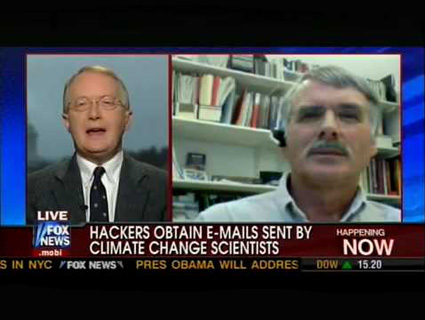Here we go again. Once more on the eve of a major United Nations negotiating session on climate change, an anonymous commenter has posted thousands of emails between scientists online. Climate change critics have already latched onto the emails as “Climategate 2.0.” Much like the first iteration of the manufactured controversy, the commenter released the emails with a selection of short, out-of-context quotes designed to make scientists look nefarious.
The latest release includes 5,000 additional emails, and the poster claims to have another 220,000 on a private site that he or she does not intend to release. The poster again goes by the handle “FOIA,” as was used when the first round of emails was released in November 2009.
Several of the scientists who wrote the emails have confirmed that the latest batch is legitimate. Officials at the University of East Anglia in the United Kingdom has already posted a statement, indicating that what they have read so far appear to be actual emails, and that they believe these are additional emails acquired at the same time as the initial theft.
Many are speculating that the release was intended to derail the upcoming climate talks in Durban, South Africa—which would be true, if anyone were paying attention to them in the first place. (I’ll have more on Durban in a few days.) And as with the first round, a lot of what is portrayed as sinister plotting or subterfuge among scientists is really just how science works—people disagree, they criticize each other’s work, and they sometimes aren’t very nice. And, just like in the last round, some of them show scientists discussing how to avoid turning over their emails to skeptics that would use them to bash the science. I’m hoping the irony of that isn’t lost on anyone.
Pennsylvania State University climate scientist Michael Mann, who has probably been the subject of more skeptic hatred than any of the other scientists involved in the emails, told me in an email that this latest round seems like a weak attempt to reignite controversy. “I guess they had very little left to work with, having culled in the first round the emails that could most easily be taken out of context to try to make me look bad,” said Mann. “Just another shameless effort to manufacture a false controversy, once again, on the eve of a key international climate change summit.”
I’d hesitate to call attention to a bunch of stolen, out-of-context emails at all, except for the fact that part of the reason that Climategate 1.0 was blown so far out of proportion is that most people ignored it for so long and let the denial crowd frame the conversation. By the time reasonable people caught up, it was already out of control. Journalists basically ran with the skeptic’s talking points, and despite numerous investigations and exonerations, the incident remained a stalking horse for the global warming denial crowd. For a more detailed, and lengthy, examination, see my piece on the incident from April.












